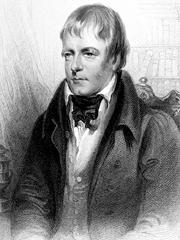
The
special literary development of Scott, while the consequence of a rare
combination of
natural gifts, was, also, largely influenced by certain exceptional circumstances
which gave it its
original impulse and did much to determine its character. He owed not a
little to his Edinburgh
nativity and citizenship. His “own romantic town,” uniquely picturesque
and variously associated
with pregnant memories of the past, was an exceptionally suitable cradle
for his genius. Long
familiarity never lessened its fascination for him.
“No funeral hearse,” writes Lockhart, “crept more leisurely than did his
landau up the
Canongate or Cowgate, and not a queer tottering gable but recalled to him
some long-buried
memory of splendour or bloodshed, which, by a few words, he set before
the hearer in the
reality of life. His image is so associated in my mind with the antiquities
of his native place that I
cannot now revisit them without feeling as if I were treading on his gravestone.”
He was also favoured, in no small degree, by his border descent and prepossessions
and an
early literary nurture on border tales and ballads. It was this that gave
the first impulse and
direction to his poetic genius; and it formed, in a sense, the basis of
his future literary
achievements. His interest in the stirring border past was awakened in
his early childhood
principally by the vivid reminiscences of his grandmother, “in whose youth,”
he says, “the old
border depredations were matter of recent tradition,” and who used to tell
him “many a tale of
Watt of Harden, Wight Willie of Aikwood and Jamie Telfer of the Fair Dodhead
and other
heroes—merry men all of the persuasion and calling of Robin Hood and little
John.” The
solitary condition of his childhood, caused by his lameness, begat, also,
precocious literary
proclivities which, otherwise, might have lain much longer in abeyance,
or might have been
largely obstructed by his strong partiality for outdoor activities. It
made him, as he modestly
puts it, “a tolerable reader,” his enthusiasm, he remarks, “being chiefly
awakened by the
wonderful and the terrible,” “the common taste,” he adds, “of children
but in which I have
remained a child unto this day.” In this respect, however, he was no more
an ordinary child than
he was an ordinary man. The stories he read produced an exceptionally deep
impression on
him, and called into early exercise his imaginative faculty. While he was
still at the High school
of Edinburgh, his tales, on days when play was made impossible by the severity
of the weather,
used “to assemble an admiring audience round Lucky Brown’s fire side”;
and his interest in the
marvellous became rather more than less absorbing as he approached manhood.
After he
became a legal apprentice in his father’s office, his strong predilection
for “romantic lore”
caused him to spend a portion of his earnings on attendance twice a week
at an Italian class,
and, for the same reason, he “renewed and extended” his “knowledge of the
French language.”
Later, he was accustomed, every Saturday in summer, and, also, during holidays,
to retire with
a friend to one of the neighbouring heights, where, perched in solitude,
they read together
“romances of Knight errantry, the Castle of Otranto, Spenser, Ariosto and
Boiardo being
great favourites.” He, also, he tells us, “fastened like a tiger upon every
collection of old songs
and romances” which chanced to fall in his way; and had a wonderful faculty
of retaining in his
memory whatever pleased him, “above all a Border ballad.”
While it was by the border tales and ballads that his romantic ardour was
first aroused, it was,
also, his ballad enthusiasm that induced him to make his first venture
in publication; and, in
ballad composition and translation, in ballad collection, annotation and
amendment, he served a
literary apprenticeship which proved to be of cardinal advantage to him
both as poet and as
novelist. Shortly after he left the High school, his interest in old ballads
received an abiding
stimulus from bishop Percy’s Reliques of Ancient Poetry, which he read,
he says, “with a
delight which may be imagined but cannot be described.” It was their romantic
stimulus that
roused his curiosity about the old romantic poetry not only of England
but of France and Italy;
and, through his German studies, begun in 1792, his ballad fervour received
further quickening
by his introduction to the modern balladry of German poets, whose interest
in this form of verse
was, also, first aroused by the Reliques of Percy.
www.bartleby.com/222/0103/html
Academic Year 2000-2001
© a.r.e.a./ Dr. Vicente Forés López
© Celia Rodado Guirado
Universitat de Vàlencia Press